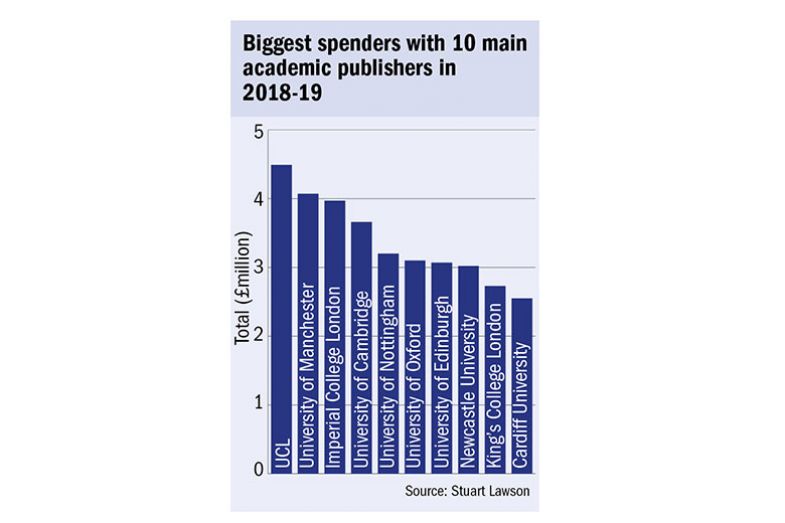UK negotiators have vowed to strike “cost-effective and sustainable” deals with big publishers, as figures reveal that subscriptions to academic journals and other publishing charges are likely to have cost UK universities more than £1 billion over the past decade.
Data obtained using Freedom of Information requests show that UK universities paid some £950.6 million to the world’s 10 biggest publishing houses between 2010 and 2019. For the sector as a whole, however, the overall bill is likely to have topped £1 billion as one in five universities, including several Russell Group institutions, failed to provide cost information.
More than 90 per cent of this outlay was spent with five companies: Elsevier, Wiley, Springer Nature, Taylor & Francis and Sage, with Elsevier claiming £394 million over the 10-year period, roughly 41 per cent of monies received by big publishers.
Overall, the main publishers collected some £109.5 million in 2018-19 – up 44 per cent from 2010, when the bill was £76.1 million. In recent years, however, publishing costs have risen less sharply, climbing by 15 per cent since 2014-15.
The largest institutional outlay was made by UCL, which shelled out £4.5 million, followed by the University of Manchester (£4.1 million), Imperial College London (£3.9 million) and the University of Cambridge (£3.7 million)
The information was collected by Stuart Lawson, a researcher on open access publishing, who said it raised questions about “whether institutions are paying a reasonable price”.
The figures emerged ahead of the first meeting of a new Universities UK group that has been set up to support sector technology body Jisc as it negotiates with major academic publishers new agreements that are in keeping with open access guidelines recently announced by UK Research and Innovation.
Those principles will require any papers accepted for publication on or after 1 January 2022 to be made “freely and immediately available online through a journal, open access publishing platform or an institutional or subject repository” if their authors are supported by public research funds.
Particular attention will be focused on the renewal of the deal with Elsevier, which expires at the end of 2021, given the outfit’s dominant place in the market. Last year, UK universities paid £39.7 million to the Netherlands-based publisher – more than double the amount paid to the next biggest company, Wiley, which collected £18.2 million.
Liam Earney, Jisc’s executive director for digital resources, said the sector would seek to reach an agreement with Elsevier that “meets the needs of our members and the requirements of the Wellcome Trust and UKRI” and was both “cost-effective and sustainable”.
“We are learning from the negotiations seen in Norway, Sweden, Hungary and Germany [which have agreed transformative deals in recent months] and will be trying to negotiate a deal that is good value for money given the challenging fiscal position that many universities now face,” Mr Earney said.
Inflation in UK journal subscription agreements had been driven down to about 2 per cent a year, he said, far below the 6 per cent inflationary rise seen globally in recent years.
“We are keen to build on what has been achieved with our members – which has seen us achieve widespread access to content – but we always need to go further, and this means including much more open access publishing at an acceptable price,” Mr Earney said.
Jisc announced on 2 March that it had struck a “read-and-publish” deal with Wiley, combining access to titles with up front payment of article-processing charges. The cost of the deal is yet to be disclosed.
jack.grove@timeshighereducation.com





